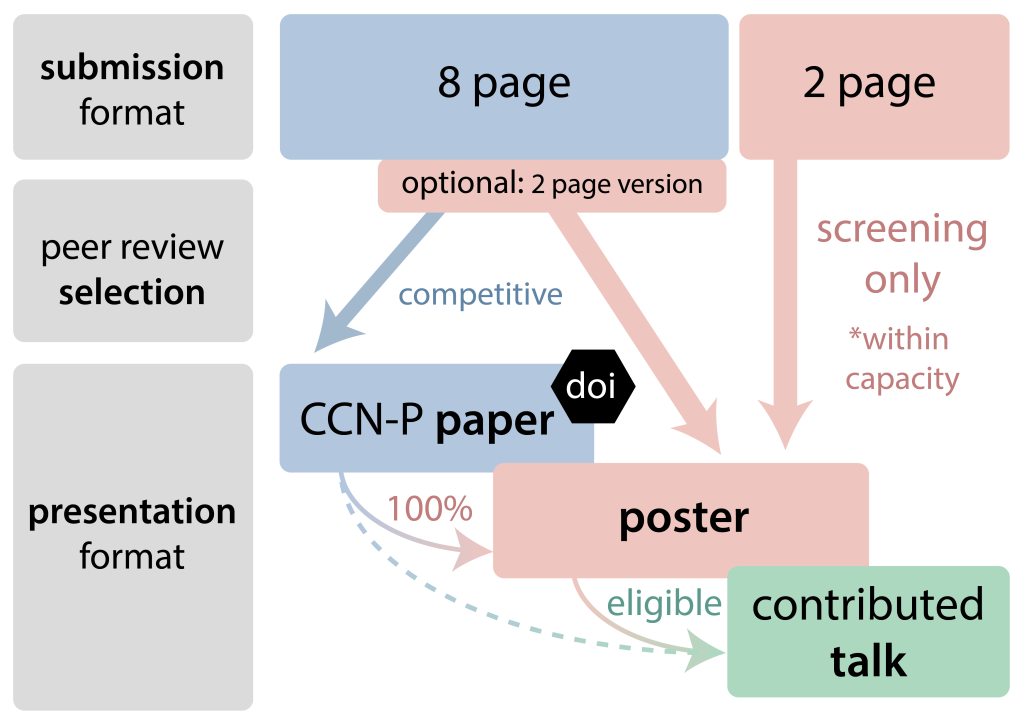Poster Presenter Instructions
Also see Talk Presenter Instructions.
Meeting Registration
All poster presenters are required to register and wear their meeting badge while presenting their poster. If you are unable to present your poster, please Contact Us as soon as possible.
Poster Sessions
All poster sessions are held in de Brug & E‑Hall. See the schedule of Poster Sessions. You can find your poster presentation time by Searching the scheduled papers.
Poster Presentations
Poster boards are 1000mm wide by 1250mm high. We recommend that your poster be A0 sheet size (841mm x 1190mm) printed in portrait orientation. Figures and type should be easily seen from a distance of 2 meters. Use clear graphics and large type to accomplish this.
Each poster is assigned a number, called the Board Number, which will indicate where to post your poster. Poster boards are numbered in the upper-right corner of the board.
Posters may be put up starting at 8:00 am on the day of your scheduled session. Please do not hang posters earlier as they may be removed. All posters must be taken down by 5:00 pm on the same day.
Supplies and Equipment
Pushpins are provided at each poster board to mount your poster to the board. Additional pushpins are available near the poster room entrance. Tape, glue and other adhesives are not to be used on the poster boards.
Contact signup sheets are available in the poster room. Pin the contact signup sheet on your board if you would like people to leave their name and email for future contact.
Suggestions for Creating Effective Posters
- Prepare a title banner indicating abstract title, author(s) and affiliation(s). Lettering should be at least one inch high.
- Minimize narrative.
- For figures, use dark colors on white or light backgrounds. Figures should be designed to be viewed from a distance (about three feet).
- Use large type and short separated paragraphs.
- Do not set entire paragraphs in boldface or capital letters.
- Numbered or bulleted lists are a concise but effective way to convey a series of points.
- It is not necessary to post a copy of your abstract.
Technical Assistance
If you have a problem of any kind, need assistance hanging your poster, or need supplies, look for the CCN staff person stationed near the entrance of the poster room. If you cannot find CCN staff in the poster room, go to the Registration Desk for assistance.
Poster Printing
We encourage poster presenters to print out their posters ahead of time and bring them to the conference, as local printers may not have capacity to do a large number of posters on short notice.
Keep in mind that during busy times, it may take one or more working days for your poster to get printed (for pickup from Printenbind, the default delivery time is 1-2 working days). We recommend that you get your printing order placed before arriving in Amsterdam.
Here is a list of local printers:
Printerette
Location: Roetersstraat 10-b, 1018 WC Amsterdam, Across the street from the conference location
Open during weeks days from 09:00 till 17:30, Closed on the weekend
Total Copy Service
Location: Eerste Oosterparkstraat 126B, 1091 HG Amsterdam, 1.0 km (14 minute walk) from the conference location
Lowie Kopie
Location: Linnaeusstraat 107, 1093 EL Amsterdam, 1.6 km (23 minute walk) from the conference location
CopyStop
Location: Wijdesteeg 3B, 1012 RN, Amsterdam, 2.2 km (31 minute walk) from the conference location
Open during weeks days from 09:00 till 18:00, Saturdays open from 10:00 till 17:00
Location: Kabelweg 44A, 1014 BB Amsterdam, 6.7 km from the conference location
Printenbind has various convenient pickup points around Amsterdam. You will be able to select a location at checkout. For example, the A'dam pickup point House of Watt is located near the Casa hotel and Amstel station (two metro stops away from the conference location), and the PostNL Choose Happiness pickup point is a 15 minute walk away from the conference location. Some of the pickup points are cafés, sports centres, tobacco or stationary shops, etc. Just ask at the bar / reception / counter for your Printenbind order.

